1
Thomas Kilby was born in July 1868 in Durham, England. He immigrated at a very early age to a cousin's farm in the Ottawa Valley, and then traveled across Canada with his cousin's household goods and livestock on the first trainload of "settler's effects" to use the Canadian Pacific Railway mainline. He eventually arrived in Sapperton, BC, where he met Eliza Anne Finlay, a widow from Manchester, England. Thomas and Eliza were married in 1889 and their son Acton, an only child, was born the following year.2
Thomas Kilby20th Century, Circa 1906
Kilby Historic Site, Harrison Mills, British Columbia, Canada
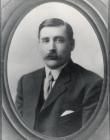 Credits:
Credits:Fraser Heritage Society
3
Eliza Kilby20th Century, Circa 1906
Kilby Historic Site, Harrison Mills, British Columbia, Canada
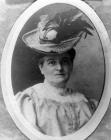 Credits:
Credits:Fraser Heritage Society
4
Thomas and Eliza established a "milk ranch" where the present-day Cariboo Shopping Centre is located at the junction of Lougheed Highway and North Road in Coquitlam, BC. In 1903, economic conditions forced a move to Harrison Mills, BC where Thomas and Eliza managed a boarding house for a local timber company. The company store was destroyed by fire in 1906 and the Kilby's promptly bought property on which they built their own store. Soon after, Thomas became the postmaster. As business continued to improve, the store was expanded to include a "temperance" hotel, which Eliza named "Manchester House." It is that building which forms the core of the present Kilby Historic Site.5
T. Kilby Hotel & General Store20th Century, Circa 1906
Kilby Historic Site, Harrison Mills, British Columbia, Canada
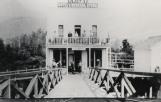 Credits:
Credits:Fraser Heriatge Society
6
Acton Kilby, born in 1890, son of Thomas and Eliza Kilby attended Columbian College in New Westminster from 1902 until 1907. Early in 1907, he left school to help with the family business. Aside from the normal jobs around the business, Acton was assigned to one really demanding task. The store had a contract to supply groceries to a construction company who were building the Bridge River power station at Shalath on Seton Lake, and Acton ran the pack-train into the site. Because there was no road bridge across the Harrison River, he had to stable his horses with C.N. Pretty. He ferried the supplies across by boat, loaded the animals, and then trekked along Chehalis and Harrison Lakes to Port Douglas, up the Lillooet River to Lillooet Lake and, finally, over to Seton Lake.7
Pack Train at Harrison Mills20th Century
Kilby Historic Site, Harrison Mills, British Columbia, Canada
 Credits:
Credits:Fraser Heritage Society
8
Acton also served as Alderman on Kent municipal council for two years prior to service in World War I and for one additional year later on. He joined the Royal Flying Corps as an air observer in 1916. He was injured in a crash during a training flight in Texas and was medically released. Unfortunately, the Kilby Store had closed in 1917 and was not destined to open again until early 1920. In addition, the farm had been barely providing support for Thomas and Eliza. Luckily, upon his discharge in 1918, Acton found employment in the General Store in Savona.While in Savona, he met Jessie Barton, a young schoolteacher. Jessie was the second eldest child of a pioneer Cariboo family of nine. Her father, Thomas Barton, was born in Wakefield, Quebec, in 1854. The Cariboo Gold Rush brought him to British Columbia and he eventually became the government road superintendent on the Clinton section of the Cariboo Highway. Jessie's mother, Maggie Cunningham, came from Scotland to her brother's home at 74 Mile House. Tom and Maggie were married in 1892 and made their home in Clinton. It was there that Jessie was born in 1896. Jessie attended high school in Vancouver, and later earned her teaching diploma at Vancouver Normal School.
Margaret Kilby Robertson tells the story of how her parents Acton and Jessie met:
"Daddy met Mother when he was working at the general store in Savona, and she was teaching school. He took her across Kamloops Lake to meet some other people who took her over the mountains so she could supervise the grade eight entrance exams. On their first date he was very romantic and showed her where he draped his wash on the bushes to dry!"
9
Boardwalk to the Kilby General Store20th Century, Circa 1930s
Kilby Historic Site, Harrison Mills, British Columbia, Canada
 Credits:
Credits:Fraser Heriatge Soceity
10
Acton and Jessie were married on December 24, 1919, and went to live in Merritt where Acton was employed as a government land assessor. Unfortunately, Thomas Kilby was diagnosed with cardiac illness. The young couple returned to Harrison Mills in 1922 and took up residence in the quarters behind and above the store. While living there, three children were born, Gordon Finlay (June 18, 1925), Margaret Dorothy (December 25, 1927), and Thomas Acton (May 31, 1929). During that time, Jessie's mother died at age fifty-three in October 1926. Thomas Barton, died in July 1929.11
Kilby Family Home20th Century, Circa 1929
Kilby Historic Site, Harrison Mills, British Columbia, Canada
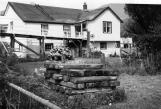 Credits:
Credits:Fraser Heritage Society
12
Thomas Kilby passed away in September 1929, Eliza passed away in March 1930 (Acton's parents). With Eliza's death, Acton, Jessie, and the children moved into the cottage behind the store. Some three years later, Peter Barton, the last of the four children, was born on October 17, 1933.13
Kilby Home in 1948 Fraser River Flood20th Century
Kilby Historic Site, Harrison Mills, British Columbia, Canada
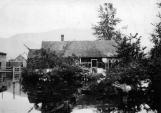 Credits:
Credits:Fraser Heritage Society
14
During the late 1920s, Acton became very involved in the marketing of milk produced in the Fraser Valley through the Milk Shippers Agency, an organization that operated in direct competition with the Fraser Valley Milk Producers Association. That agency operated until 1959, when changes in provincial regulations led to its closure. During that time, Jessie became the "resident manager" of the farm, store, post office, and family home. Many loyal and competent individuals assisted her with her numerous tasks, but it was her leadership that held things together.The post-World War II growth in community members becoming more mobile led to a decline in the store business. In addition, the 1948 flood and its aftermath made the farming situation extremely difficult. To counter these two money-losing situations, the herd was sold and the land rented or sold to local farmers. The store and post office remained in operation and Acton's motto, "You never know; someday, someone may want it," led to the store evolving from a quaint family museum into a popular tourist attraction.